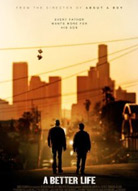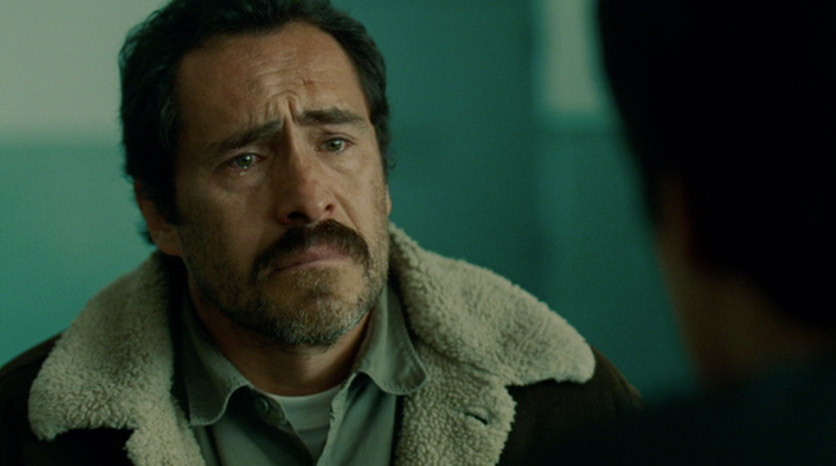Scene Work: Demián Bichir & Chris Weitz on "A Better Life"
 Monday, November 21, 2011 at 10:05PM
Monday, November 21, 2011 at 10:05PM  In this new miniseries, we'll be discussing some of the most memorable individual scenes of the movies of 2011. So let's start with the penultimate scene from the immigration drama A Better Life. Have any of you seen it?
In this new miniseries, we'll be discussing some of the most memorable individual scenes of the movies of 2011. So let's start with the penultimate scene from the immigration drama A Better Life. Have any of you seen it?
At a recent luncheon honoring Demián Bichir (Weeds, Che), currently on the Best Actor campaign trail, I had a brief chat with the star and his director Chris Weitz. Our conversations kept drifting to two scenes in the movie, the aforementioned emotional peak when Carlos (Bichir) explains to his son, as best he can, the reason why he moved to America and had a child, and an earlier intense sequence that sets much of the plot in motion as Carlos (Bichir) makes a fateful mistake while shimmying up a palm tree in his day job as a gardener.
I told Bichir that I've always wondered how scary it is for actors to work on those slow build performances. Many performances have several peaks but A Better Life is quite a linear drama and Bichir keeps the performance very low key for a long time. It's all building to his intensely emotional monologue as he sits in a deportation center with his son. I wondered how nerve wracking that scene must have been for him. He plays the scene beautifully, with so much pent up painful intimacy. But as character arcs go it's very backloaded; his entire performance and indeed the film, rests on it.

That's why I had you. For me. For me. For a reason to live."
"Interesting," Bichir says, considering the question. "I try not to think about that. I never think ahead." he confesses, explaining that he tries to take the journey in sequence with the character, though he readily admits that you know the scenes in every script your first time reading through.
"So I don't think about it," he elaborates. "It's like in life. You know, when you're in love you don't think 'what if we break up?' You don't think about the fears or the negativity." The emotional place you have to get to you just work towards day by day, he explains. They were lucky to shoot almost chronologically which really helped him.
Oscar Campaigning and a unexpected Twilight diversion after the jump.
"I remember when we shot those last few days we all were really really sad about first, the fact that we were almost finished and second, we had been really worn down by the character's journey. It was an emotional ride for all of us. Not only for me."
After wishing them well on the campaign I asked Weitz how well he remembers the campaign trail? He'd been through this before, after all, with Hugh Grant in About a Boy (2002), I figured.
"This is a little different. I'm used to the big machine," Weitz explains, elaborating on the instant traction a movie star gets you with year-end hoopla. "There's a certain in-built excitement no matter what. But people need to see Demián's performance before they get it. The film is the advertisement. With bigger movies -- it sorts of pre-sells itself, generates its own interest."

On a lighter note I had to know about the movie's other key scene when Bichir climbs the tree. 'Movie trickery?' I wonder aloud. Nope! As it turns out there's even a continuous shot, not in the film Demián recalls, which, "...takes me all the way from getting my gear on then wrapping it around the tree and then going all the way up. I did it several times that day, maybe ten times. Chris Weitz did it too. He did it before me!"
"It's true," Weitz tells me but quickly shrugs off the derring-do. "We're not heroes! We had safety harnesses and stuff. But I did go up first because I want to know what I'm asking my actors to do, how difficult it is." Naturally I have to know if this is an isolated thing or a habit. The conversation unexpectedly swings towards The Twilight Saga: New Moon (2009).
 "There was going to be a shot in which we needed Kristen, who then had a raging cold, to be 12 feet under water in a weighted costume so we could get this kind of dreamy shot of her in the water. I thought 'this is not going to be an issue. I'l try it myself!' I get to the bottom of the pool with weights on my chest and I started to panic -- panic sets in. and I said 'We can't do this with Kristen!' We ended up shooting it sideways but to be 12 feet under water with weights on you is not an experience I recommend." Weitz says smiling. "The funny thing is Robert had done underwater work before [Harry Potter and the Goblet of Fire] and he was fine."
"There was going to be a shot in which we needed Kristen, who then had a raging cold, to be 12 feet under water in a weighted costume so we could get this kind of dreamy shot of her in the water. I thought 'this is not going to be an issue. I'l try it myself!' I get to the bottom of the pool with weights on my chest and I started to panic -- panic sets in. and I said 'We can't do this with Kristen!' We ended up shooting it sideways but to be 12 feet under water with weights on you is not an experience I recommend." Weitz says smiling. "The funny thing is Robert had done underwater work before [Harry Potter and the Goblet of Fire] and he was fine."
Weitz is an amiable guy and immediately paints an elaborate picture of how complicated underwater shots are to film, so many people in the water, so much gear. "You do not want your start to drown. That would be bad," he says laughing. "You find yourself in a lot of strange positions making movies: top of tree, under water."
 A Better Life,
A Better Life,  Best Actor,
Best Actor,  Chris Weitz,
Chris Weitz,  Demián Bichir,
Demián Bichir,  Mexico,
Mexico,  Oscars (11),
Oscars (11),  interview
interview 


Reader Comments (2)
I loved A Better Life. I hope he gets nominated.
I agree with timothy. I just saw A Better Life and was so impressed. I couldn't believe it when I realized that Bichir also plays Estaban on Weeds. Definitely an actor with enormous range.